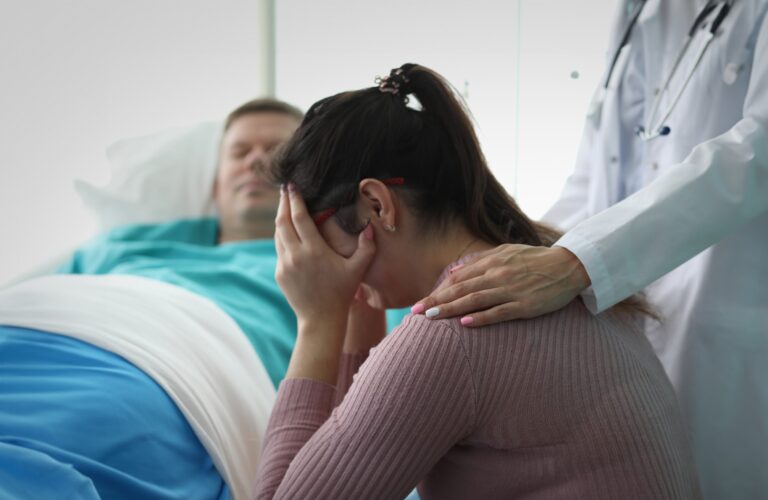
Has losing a loved one changed your life?
Sadly, the death of a loved one is a life-changing and devastating moment for surviving family members, especially when it is due to someone’s negligence or carelessness. The grieving process is always difficult for everyone involved, with many complicated and intense emotions surfacing.
In the U.S., the leading causes of wrongful death are:
- Auto collisions
- Truck accidents
- Motorcycle accidents
- Bicycle collisions
- Medical malpractice
- Defective products
- Work-related accidents
- Construction accidents
Filing a wrongful death claim can help with the financial burden
Having to deal with any kind of unexpected loss, particularly that of a loved one, is one of the most emotionally stressful situations any of us may be called to face. The death of a person close to us, irrespective of the circumstances under which it occurs, is always a life-changing and often devastating moment for surviving family members.
At the same time, one cannot overlook the practical impact that an unexpected death also has on the surviving family of the deceased, especially in situations where its members find that they no longer have a primary earner. Having to deal with an unexpected financial burden on top of the existing emotional distress is a very difficult position to find yourself in. It is imperative that you address it in the most effective and expeditious way possible.
Work with an understanding & experienced personal injury lawyer
If you find yourself in such a position and are considering taking legal action, an experienced and understanding Englewood personal injury lawyer, who will have your best interests at heart is exactly the kind of advisor and ally you should be looking out for to guide you through this demanding process. Call us today at (303) 351-2567 to schedule a free case consultation.
What is a wrongful death claim?
A wrongful death lawsuit is a special type of civil legal action that the surviving family may be entitled to take in order to have those who caused or contributed to the wrongful death of a loved one be held accountable. In Colorado, the main legal framework is provided by the Colorado Revised Statutes §§ 13-21-201 through 13-21-204, also commonly referred to as the Colorado Wrongful Death Act.
Wrongful death actions may be filed in situations when the demise of a person is caused by the legal fault of another
As a wrongful death lawsuit in Colorado may be brought for the death of any “person,” Colorado courts have held that a child who is born alive but who dies after birth is to be considered a “person” within the meaning of the term under the Wrongful Death Act. Hence, in cases where a child suffers prenatal injuries, is born prematurely due to this fact, and subsequently dies as a result, the parents may be entitled to commence a wrongful death action against the person or entity who caused the injuries that caused their child’s demise.
To succeed in a wrongful death action, you must establish neglect/negligence or intent to cause the deceased individual harm
To succeed in a wrongful death action, it is necessary to establish neglect/negligence or intent to cause the deceased individual harm, causation, as well as that you have suffered related damage as a result of those events. In other words, you will have to show that the defendant(s) in the action owed a duty of care to your loved one, which they breached. It must also be proved that it was this breach that caused the death of your loved one and that, because of this, you have suffered a corresponding loss.
A wrongful death lawsuit is meant to provide financial support for orphans and widows
Some of the key types of losses that may be recovered through damages relate to medical and funeral expenses, lost wages, damages for pain and suffering, and lost companionship.
It must also be stressed that in accordance with Colorado legislation, a wrongful death action may be successfully maintained only in cases where the deceased person, had they survived, would have been legally entitled to recover damages against the person(s) who caused the injury or condition resulting in death.
How do you know if you can file a wrongful death claim?
In situations where a wrongful death has arisen, one or more surviving family members of the deceased can bring a wrongful death action to court. The purpose of wrongful death laws, including those in Colorado, is to provide monetary compensation to family members who depended financially on the deceased.
Although the question of who has standing to bring a wrongful action claim is normally straightforward, there are difficult cases where there may be parties with conflicting claims, resulting in conflicts of interest. Examples include common-law marriage disputes or unestablished paternity/maternity claims.
Certain situations may alter this two-year deadline, giving more or less time to file a claim. For instance, under Colorado’s Dram Shop Act, the statute of limitations is one year. If the death resulted from a car collision, the family has three years to file a claim. The statute of limitations can also be extended in cases of fraud or obstruction by the defendant.
The crucial thing to remember is to set up your case as early as possible and seek solid advice to support your claim effectively.
Who can file a claim under the Colorado Wrongful Death Act:
- Primarily, the surviving spouse and children of the deceased.
- If there are no immediate family heirs, the deceased person’s parents may file a claim, but only if the child is not survived by a spouse or heirs.
- Siblings, uncles, and aunts are typically precluded from filing a wrongful death lawsuit.
Statute of Limitations in Colorado:
- Generally, family members have two years from the date of death to file a claim.
- During the first year, only the surviving spouse can file a wrongful death action.
- In the second year, both the spouse and any surviving children can file or join an action.
Wrongful death claim vs survival action
Wrongful death actions should not be confused with survival actions, which are similar yet not the same as a wrongful death claim. Practically speaking, an action under the Colorado Survival Statute (Colorado Revised Statutes Title) may take place alongside an action under the Colorado Wrongful Death Act, therefore the two are not mutually exclusive.
A survival action usually takes place in circumstances when the deceased person has no surviving family members and a representative of their estate (typically the executor) files a claim to recover the damages for the losses to the estate. If successful, a survival action will lead to the granting of compensation for various expenses associated with the injuries sustained by the deceased up until the time of their death, such as pre-death medical expenses, lost wages that occurred during the period between the infliction of the injuries and the person’s death, etc.
A wrongful death action has as its main aim to repay the beneficiaries of the deceased directly for the losses that they have suffered, the damages ordered in a survival action correspond to those that the deceased would have recovered if they had survived and had been able to file a personal injury lawsuit themselves. Thus, while wrongful death actions are brought for the benefit of a person’s beneficiaries, survival actions are brought on behalf of the deceased person’s estate to compensate the person who died.
Events that can cause a wrongful death
In our extensive and long-standing experience, there is no such thing as an “easy” wrongful death case, as each one entails individual difficulties and complications, while having to fulfill the complex requirements set for establishing both liability and causation.
- Car & other motor vehicle accidents
- Aviation & boating accidents
- Skiing and sports accidents
- Construction & workplace accidents
- Accidents from defective premises (premises liability)
- Fires & explosions
- Pedestrian accidents
- Swimming pool accidents
- Substandard medical, surgical, hospital, or nursing home care
- Injuries caused by defective products
- Slip-and-falls
- And many other accidents

Types of damages you can recover in a wrongful death claim
Pecuniary damages, meaning the type of damages that can be calculated in financial terms, typically represent the main measure of damages for wrongful death actions. Therefore, broadly speaking, claimants in such actions can normally be compensated for:
- Lost income, especially if the deceased was the primary earner who used to support family members financially. This may include streams of actual income lost but also future expected income, as well as potential loss of benefits, such as the deceased’s insurance.
- Medical bills that arose because of the injury that led to the death of your loved one, prior to their passing.
- Funeral costs that must be covered and other related expenses.
- Costs arising from loss of care, maintenance, and general support caused by the person’s demise. The law recognizes that, even if the deceased was not the primary earner, they may well have made a significant contribution to the family in other ways that will now give rise to additional expenses (for example childcare, household maintenance and management, and so on).
The calculation of some economic benefits can be far from straightforward, as not all quantifiable losses can be easily and clearly assessable. Unlike medical expenses or funeral bills, which may be quite specific, determining loss of future expected income or the cost arising from loss of care, maintenance, and general support is more challenging. For such expenses, the assistance of an expert, such as an economist, may be required, so working with a Colorado wrongful death attorney who will have a trusted network of professionals that can help and guide you along the way, may prove to be invaluable.

Non-economic damages can be part of wrongful death compensation
In a similar vein, non-economic damages that may be recoverable usually relate to:
- Pain and suffering you experience due to the death of your loved one, and possibly also compensation for the pain and suffering endured by the deceased person before their death.
- Loss of companionship, or “loss of consortium”, is the legal term for describing the effect that a loved one’s demise has on relationships, companionship, and support lost due to this tragic event.
The determination of the above is clearly quite a subjective exercise, and the amount of damages recoverable will depend upon proof of the closeness and duration of the relationship between the decedent and the surviving parties. Unsurprisingly, the rules governing such types of non-economic damages in Colorado are very complicated, rendering the process of determining the amount one should claim a rather intricate and difficult one.
How much can I recover?
When it comes to the actual amounts you may be able to recover following a wrongful death action, things become even more complicated. As each case is different, and only a broad indication can be offered in good conscience, it may be helpful to keep in mind the following:
- There is generally no limit to the amount of economic damages that can be recovered in a wrongful death action, as they are not subject to a statutory cap. Nevertheless, the amount of recoverable damages will still be calculated based on the net pecuniary loss sustained by the plaintiff.
- Recoverable non-economic damages for grief, sorrow, and loss of companionship are limited by statute to the amount of $436,070 (as of March 2022).
- The total amount of all damages recoverable, meaning both economic and non-economic, for the death of a decedent who is not survived by a spouse, minor children or dependent parents, is currently also capped at $436,070.
- The above statutory caps can be lifted if the plaintiff can prove that the decedent’s death resulted from a “felonious killing”, which includes first-degree murder, second-degree murder, or manslaughter.
Lastly, some may not wish to testify in court and present proof as to their assessment of non-economic damage, for many obvious sensitive reasons. That is why the Colorado Wrongful Death Act provides the option of electing to recover the “solatium amount” instead of presenting proof of actual non-economic damages, which is currently set at $87,210 (March 2022). Since the recovery of this solatium amount requires no proof of any actual damages, it essentially represents the “floor value” of any wrongful death claim under Colorado law.
Contact Our Colorado Wrongful Death Lawyers Today
Our experienced legal team is here to assist you and your family in this stressful and challenging time. Ross Ziev, Joanna Merrill, and Joseph Martin, along with our entire legal team at Legal Help in Colorado, is committed to getting justice.
Reach out to us today to schedule an appointment. Initial consultations are free and conducted with absolute confidence. If we take on your case, you can rest assured that our contingency payment policy means that you will not have to worry about being able to afford a skilled Colorado wrongful death lawyer, on top of all other pressing considerations, as we only get paid when we win your case.




